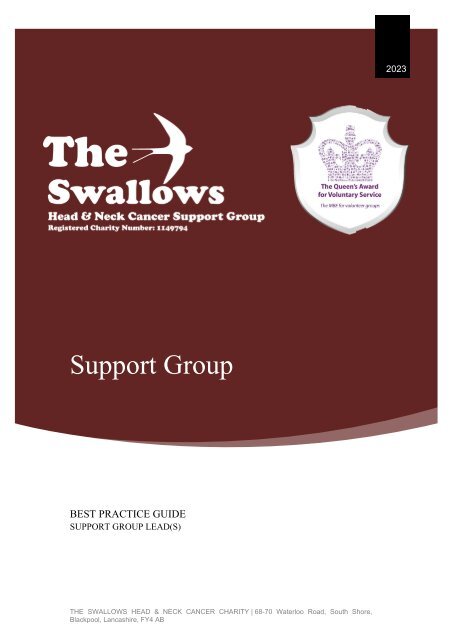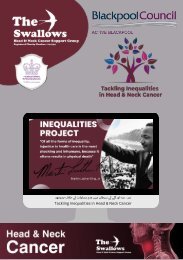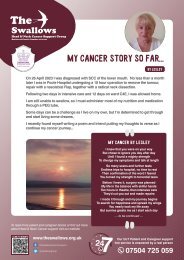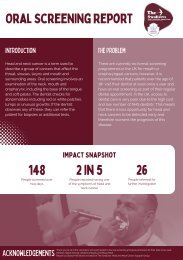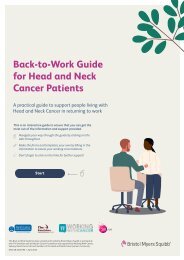1. Guidelines Best Practice 2023
This will help you the Patient/Caregiver lead with running the support group.
This will help you the Patient/Caregiver lead with running the support group.
Create successful ePaper yourself
Turn your PDF publications into a flip-book with our unique Google optimized e-Paper software.
<strong>2023</strong><br />
Support Group<br />
BEST PRACTICE GUIDE<br />
SUPPORT GROUP LEAD(S)<br />
THE SWALLOWS HEAD & NECK CANCER CHARITY | 68-70 Waterloo Road, South Shore,<br />
Blackpool, Lancashire, FY4 AB
CONTENT<br />
PAGE<br />
WELCOME 2<br />
WHAT IS THE CHARITY ALL ABOUT 2<br />
THE CHARITIES AIMS 2<br />
VOLUNTEER GUIDELINES 3<br />
ACCEPTING GIFTS OR TIPS 3<br />
MONITORING & FEEDBACK 3<br />
EXPENSES 3<br />
POSSIBLE CHALLENGES 3<br />
IF YOU ARE DELAYED OR UNABLE TO ATTEND 3<br />
YOU ARE UNWELL 3<br />
COMMUNICATION PROBLEMS 4<br />
A PATIENT/CAREGIVER BECOMES UNWELL 4<br />
FIRST AID REQUIREMENTS 4<br />
ABOUT THE CHARITIES SUPPORT 4<br />
HOW TO RESPOND 5<br />
APPROPRIATE RESPONSES 5/6<br />
SELF-CARE 6<br />
STRESSORS INCLUDE 7<br />
RELAXATION TECHNIQUES 7<br />
COMPLAINTS PROCEDURE 8<br />
GROUP LEAD BEST PRACTICE 8<br />
THE MEETING ROOM 8/9<br />
DISPLAYS 9<br />
SPEAKERS 10<br />
PAPERWORK 10/11<br />
LEADING A MEETING 11/12/13<br />
VOLUNTEER ROLE 13/14<br />
FUNDRAISING 14<br />
TYPES OF TREATMENT 15/16/17<br />
CONTACT DETAILS 18<br />
CONFIDENTIAL STATEMENT 19<br />
HARD COPIES OF PAPERWORK 20<br />
Doc 1 *Updated: 12 th January <strong>2023</strong> cc<br />
1
Welcome to the family!<br />
It is great to have you as part of our team!!<br />
This is your support group folder for reference, with necessary documentation and best practice<br />
guidelines for leading one of our Patient & Caregiver Support Groups - this information may be<br />
updated from time to time.<br />
What is the charity all about?<br />
At the charity we know that a cancer diagnosis and treatment can be a very difficult, and sometimes<br />
harrowing experience, many people feel out of control, lose their self-value or feel isolated. Cancer<br />
treatment is often difficult to cope with and takes a physical toll on the body.<br />
The charity was established to enable Head & Neck cancer patients and their caregivers to take time<br />
out to meet like-minded people and share experiences in a relaxed environment. We are known as<br />
“The Swallows Head and Neck Cancer Group charity” because of the difficulty a lot of people have<br />
with swallowing, during and post treatment.<br />
Helping patients and caregivers develop a sense of well-being, improving quality of life and<br />
increasing self-worth are central aims of the charity. We reach out and offer support 24/7 and will<br />
signpost if that’s what you need. The Charity is run by patients, caregivers, family and friends, so<br />
everyone understands the challenges that can occur when you are diagnosed with Head & Neck<br />
Cancer.<br />
The charities aims.<br />
• Help each other and anyone else who is affected, directly or indirectly, by this type of cancer.<br />
• One to one or group support.<br />
• Be available in Clinics to help patients and caregivers as required.<br />
• Advise on locating reliable literature, information and locally available resources.<br />
• Signpost links to other groups in different areas and recommend trusted websites for people<br />
at home.<br />
• Raise funds for items to help both patients and caregivers.<br />
• 24/7 help line answered by patients and caregivers, offering a like-minded person to talk to.<br />
Below are examples of just some of the ways our volunteers help and make a real difference to people<br />
affected by cancer.<br />
• Group Leads running our monthly support groups.<br />
• Group Assistants at our monthly support groups.<br />
• Awareness - distribute leaflets/info to local GP surgeries/dental practices.<br />
• Help with taking patients to hospital appointments.<br />
• Join us at fundraising events across the country.<br />
• Assist in acquiring items for raffle prizes at events.<br />
• Encourage local employers/business to have us as their nominated charity for the year.<br />
• Donate to the charity shop based in Blackpool if in your area.<br />
• Raising funds through sponsored activities/events.<br />
•<br />
Doc 1 *Updated: 12 th January <strong>2023</strong> cc<br />
2
Volunteer <strong>Guidelines</strong><br />
The charity fully appreciates and value the time and energy that a volunteer gives to the charity and<br />
aims to provide roles that a volunteer is proud and happy to fulfil while gaining satisfaction in<br />
participating in a worthwhile activity. The charity will provide ongoing instruction specifying the<br />
type of assistance needed within each role and it is important that volunteers comply with these<br />
instructions.<br />
In addition, the following general guidelines should be adhered to:<br />
• Greet everyone warmly and make them feel comfortable and welcomed.<br />
• Let the group set the tone of the session – they may not want to talk.<br />
• Respect confidentiality and refrain from asking personal questions.<br />
• Be careful using humour – someone may be offended.<br />
• Be careful not to act as a counsellor do not offer medical advice.<br />
• Accommodate all reasonable requests.<br />
• Be the bridge between the group and the hospital team.<br />
Accepting Gifts or Tips.<br />
It is not appropriate to accept gifts or tips, if someone wants to donate, they can do this in the donation<br />
box on the display table, through the website, posting it to Head Office.<br />
Monitoring and Feedback:<br />
The charity will provide ongoing support to volunteers, you will also be asked to complete an<br />
evaluation sheet every 6 months.<br />
Any significant problems encountered in any session should be reported to the charity immediately<br />
on sharon@theswallows.org.uk<br />
Expenses.<br />
Reasonable out of pocket expenses, directly relating to volunteering and in line with our expenses<br />
policy (copy available from info@theswallows.org.uk), can be reimbursed.<br />
Possible Challenges.<br />
You are delayed or unable to attend a meeting.<br />
Contact the joint group lead and/or Sharon as soon as possible and keep in touch.<br />
You are unwell.<br />
Contact the joint group lead and/or Sharon immediately and we will try to get a cover lead for the<br />
meeting if there hasn’t been one identified already for the group.<br />
- cancer patients often have weakened immune systems and are very susceptible to infection.<br />
- Volunteers must look after their own health and safety.<br />
Doc 1 *Updated: 12 th January <strong>2023</strong> cc<br />
3
Communication problems.<br />
There are a variety of potential communication problems e.g., the patient/caregiver may have hearing<br />
difficulties, speak another language or have had treatment that impedes communication.<br />
- be patient and listen – don’t try to finish the persons sentences.<br />
- If unsure, repeat back what was said to confirm.<br />
- Speak clearly, at a steady pace.<br />
- Have a pad of paper, pen or a Boogieboard available.<br />
- Do not use impatient or disparaging body language, facial expressions or tone of voice.<br />
A patient/caregiver becomes unwell.<br />
There may be occasions when a patient/caregiver will feel unwell - if such a situation occurs you<br />
should assess the situation, apply common sense, contact first aider at the venue if appropriate.<br />
Behave as you would if this was a friend or family member.<br />
You are not expected to provide first aid or medical intervention.<br />
If the patient/caregiver would like to stay and it is safe for them to do so, be relaxed but aware and<br />
cautious.<br />
**Always report any incident to Sharon on sharon@theswallows.or.uk and call 07572 493 874<br />
and complete the monthly meeting report**<br />
About the charities support<br />
The charity is there for anyone who has been diagnosed or effected with/by head and neck cancer.<br />
They may:<br />
• have recently been diagnosed and undergoing treatment for the first time.<br />
• be undergoing ongoing treatment.<br />
• have had cancer in previous years.<br />
• be suffering a reoccurrence.<br />
• have completed their treatment and be in good health.<br />
• Have a family member or friend with the cancer.<br />
• Be a caregiver for someone with the cancer.<br />
The charity is there for patients, caregivers, their families and friends.<br />
Each patient/caregiver will be at a different stage in relation to cancer and they have turned to the<br />
meeting for advice, support, help or just to talk and listen to others.<br />
Please remember:<br />
• you are the face of the charity, an ambassador.<br />
• attend to everyone in a respectful, non-judgemental way.<br />
It is important to remember that patients, and their companions, could be going through a difficult<br />
time (as you may have done) filled with hospital visits and tests and powerful treatments such as<br />
surgery, chemotherapy and radiotherapy and all of this has a profound physical, emotional and social<br />
effect – all of which you may be familiar with.<br />
Doc 1 *Updated: 12 th January <strong>2023</strong> cc<br />
4
As a group lead you will meet people who are going through these experiences as you may have done<br />
and who may be:<br />
• recovering from surgery<br />
• undergoing aggressive treatments<br />
• worried about their body image<br />
• suffering a lack of confidence<br />
• feeling fearful, worried, isolated<br />
• in need of reassurance<br />
Patients although not exclusively may be feeling upset, anxious, fearful or angry about their situation<br />
and may exhibit some of these feelings. If they choose to talk – listen and show understanding, and<br />
compassion do not relay your experiences unless relevant to the conversation as the group member<br />
comes first in this instance.<br />
How to Respond<br />
• give the person time.<br />
• listen if that person wants to talk about their experience – they may not always want an<br />
answer.<br />
• allow tears – tissues should be handy to offer if needed.<br />
• do not be embarrassed.<br />
• carry on a normal conversation.<br />
• don’t try and tell the person what to do, nor give out information unless asked – and always<br />
follow our guidelines.<br />
• if you are asked questions you can’t answer, refer to the heath professional team lead or<br />
Sharon for advice, but remember put the question on the report sheet.<br />
• most important – JUST BE YOURSELF<br />
Appropriate Responses.<br />
Patients and caregivers may want to talk about aspects of their treatment or experience that are<br />
delicate and, as a representative of the charity, you may have to be careful of what to say in reply and<br />
NEVER GIVE MEDICAL ADVICE.<br />
Examples are as follows:<br />
• A volunteer has had a cancer experience and the patient/caregiver asks them.<br />
It is ok to share this in a simple way if you feel comfortable doing so. It may help the patient<br />
to hear someone else’s journey, however, do not go into lots of details.<br />
• A patient asks for a volunteer’s opinion on their treatment.<br />
You can listen, you should not discuss a patient’s treatment, instead tell them that you are not<br />
qualified to answer those questions. Advise them to speak to their consultant or one of the<br />
hospital staff if they have questions they would like to discuss.<br />
Give them our 24/7 number as a support service they could use.<br />
Doc 1 *Updated: 12 th January <strong>2023</strong> cc<br />
5
SELF-CARE<br />
• The patient/caregiver is unhappy with hospital staff and starts talking about it<br />
Just listen – they may just want to vent off with someone. Encourage them to share what they<br />
are saying with a family member or one of the hospital staff they trust. Don’t agree with them<br />
or get involved in a big discussion around it as you could be quoted by them later.<br />
You could say something like – “it sounds like you’re not having a good experience, maybe<br />
you should talk to one of the staff or your GP about it”.<br />
• The patient wants to try alternative therapies and asks for advice.<br />
Explain that this is not an area where you would be qualified to give advice and advise them<br />
to speak to their GP or consultant.<br />
• Patient starts talking about their prognosis – looking for reassurance.<br />
This is another situation for just listening – that would be reassuring. Do not get into telling<br />
them they are looking well, and that the treatment will cure them.<br />
You could say something like – “it must be difficult for you to be thinking all of that. There<br />
are people who can help you and support you”. Offer our 24/7 number to the patient.<br />
• Patient reveals something about abuse or mistreatment.<br />
If the patient starts to make any disclosure of this nature you need to say to them that if they<br />
continue with their story, you may not be able to keep it to yourself, that you may need to pass<br />
it on. If the patient continues, remind them you will have to pass the information on to the<br />
charity. You can do this by emailing Sharon and calling if need be.<br />
• Patient/caregiver asks volunteer about another patient/caregiver who has attended<br />
a meeting.<br />
In this situation you cannot give out any information about other patients/caregivers and it is<br />
ok to say to the patient/caregiver asking that confidentiality does not allow you to discuss<br />
other patients.<br />
• Patient/caregiver asks for the volunteer’s personal contact details.<br />
Our guidelines are that volunteers do not give out their home phone numbers or addresses to<br />
patient/carers. You can say to the patient/caregiver that you are not allowed to give out that<br />
personal information but that you can always be contacted through The Swallows Head Office<br />
or your mobile number if you wish to give it out. We do also have social media for contact<br />
and if it is the wish of the group members a WhatsApp group can be formed to include the<br />
Charity Chief Executive Officer.<br />
As a Volunteer your help and support are greatly appreciated by the charity, we want you to enjoy a<br />
fulfilling and satisfying voluntary role.<br />
While you are in contact with patients/caregivers it is important to be aware of your emotional limits<br />
and set aside time for self-care. In the effort to help others, you may begin to ignore your own needs.<br />
This can eventually affect your health, relationships and quality of life.<br />
Physical health and well-being are affected by emotional health.<br />
Doc 1 *Updated: 12 th January <strong>2023</strong> cc<br />
6
Stressors include.<br />
• being with someone who has just received disturbing news about his/her health.<br />
• someone you have known over time has died.<br />
• hearing distressing stories about a patient/carers experience.<br />
If you feel this is affecting, you consider talking with<br />
• The Charity senior management<br />
• Your Health Team Lead<br />
• Your GP<br />
Self-care allows you to set appropriate boundaries in your relationships with people and maintain the<br />
self-awareness that allows you to be effective and useful while still focussing on the person who<br />
needs your support. It is important that you do not feel pressured by patients/carers into an unsuitable<br />
relationship because of their need.<br />
If a patient/caregiver needs help, advice or counselling always refer them on to the Heath Team<br />
Lead for further signposting.<br />
All volunteers have the right to a rewarding assignment, you can refuse any assignments that you are<br />
not comfortable with.<br />
Relaxation Techniques<br />
60 Second Break<br />
Close your eyes and take a deep breath. Visualise yourself lounging on a sunny beach or watching a<br />
sunset.<br />
Peaceful Focus<br />
Focus on something pleasant and beautiful in your immediate environment (a blade of grass, a<br />
painting, a colour). Concentrate on the beauty you see and breathe in. Allow the beauty to slow you<br />
down.<br />
10 second Breathing<br />
Slow down you’re breathing to a 10 second cycle. Inhale for 5 seconds, then exhale for 5 seconds.<br />
Keep this up for 2-5 minute to calm yourself.<br />
Doc 1 *Updated: 12 th January <strong>2023</strong> cc<br />
7
Complaints Procedure<br />
The Charity is committed to a high quality, accessible and responsive service and takes any<br />
complaints very seriously.<br />
Many problems can be resolved through discussion, and we will always endeavour to resolve<br />
problems as quickly and informally as possible. However, if a situation cannot be resolved in this<br />
manner the following procedures should be followed:<br />
• A written complaint should be addressed to:<br />
Private & Confidential<br />
Sharon Curtis<br />
Charity Manager<br />
The Swallows Charity<br />
68 – 70 Waterloo Road<br />
Blackpool<br />
FY4 1AB<br />
• You will then be contacted to discuss the complaint and explain any actions being taken and<br />
the timescale involved.<br />
• The relevant volunteers, patient/carers and staff members will be consulted and asked for their<br />
responses.<br />
• We will aim to resolve any complaint within four weeks of receipt.<br />
• The complainant will be informed of the outcome, in writing, by the end of this period.<br />
Group Lead <strong>Best</strong> <strong>Practice</strong>.<br />
The Meeting Room<br />
The venue will already have been sourced and booked, it should have easy access to parking be on a<br />
public transport route and have at least one main meeting room with the option of a second or a split<br />
to the one room to allow the breakout sessions for patients and caregivers as is the structure of a<br />
meeting. The meeting must be held in private rooms so that everyone can speak confidentially, in a<br />
safe environment and there is the option for one-to-one support if needed at any time.<br />
Some of the following points may seem obvious, but on occasion they can be missed by the venue<br />
and will need to be addressed to ensure the comfort of the group members and indeed yourself and<br />
the guest speakers.<br />
Doc 1 *Updated: 12 th January <strong>2023</strong> cc<br />
8
<strong>Best</strong> <strong>Practice</strong><br />
• Re-Confirm the room with the venue two days prior to the meeting.<br />
• Is the temperature correct for the room?<br />
• Is there plenty of water and glasses available on a table in the room?<br />
• Are there enough chairs and are they set out correctly for your meeting? Chairs in a<br />
circle/semi-circle as opposed to theatre style? Boardroom style around one large table so that<br />
is included.<br />
• Are extra chairs easily available if more people than expected arrive?<br />
• Are paper and pens supplied – if needed?<br />
• Is there a table for your display table and sample table in the room?<br />
• If any technology was asked for – a projector/screen, is it present and set up?<br />
• Is there a practice fire alarm scheduled during the time frame of the meeting that you need to<br />
be aware of?<br />
• Position the pop-up and display table in a prominent position with good space around it.<br />
Displays<br />
The display table and pop-up should be set up at every meeting of the group – this is to provide<br />
information and samples to group members at every meeting for them to take as and when needed.<br />
It also provides a visual focal point in the room to show that it is a support group meeting of the<br />
charity – important for guest speakers to see who they are talking with and what the charity does.<br />
<strong>Best</strong> <strong>Practice</strong><br />
• If permitted, have a poster up in the venue at an appropriate place to highlight that we meet<br />
there (near front door area)<br />
• The charity pop-up ‘Our Aims’ and display table should be in a prominent position in the<br />
meeting room.<br />
• Have patient & caregiver books, leaflets, samples and any info on the display table available<br />
for each meeting.<br />
• Encourage people to take as many samples as they need and to take posters and leaflets to<br />
spread the word, group members and speakers may be able to display posters at work.<br />
• You will have received a pack of leaflets, Swallows Book, leaflet holders and samples for<br />
your launch meeting. It is advantageous to keep one of everything for reference, more can be<br />
ordered from Sharon: info@theswallows.org.uk<br />
• Please do not contact sample suppliers directly, this is done by the charity for all groups. If<br />
you have any ideas of whom we could contact, please let the Sharon know.<br />
• The donation box is placed on the table as group members may want to give or have held a<br />
coffee morning or been given money from friends/family.<br />
• If it is useful, take photos of your table so you can show it to new volunteers if they are setting<br />
it up for the first time.<br />
The table is a safe place for information for new attendees until they are comfortable to ask questions.<br />
As before, it can be used to display, highlight events, fundraising targets any important information<br />
relating to the charity and the group themselves.<br />
Doc 1 *Updated: 12 th January <strong>2023</strong> cc<br />
9
Speakers<br />
You will have lots of ideas for speakers for the group and using the Suggestions Form each month<br />
will help with feedback from the group members as to what they need/want but maybe do not feel<br />
comfortable to say in the group setting.<br />
Some speakers will be arranged from Head Office as we have several charity partners who dedicate<br />
time and samples to the charity, these may be corporate representatives but have been working with<br />
us for a long time and are aware of the sensitivities of our meetings. As the group progresses and the<br />
awareness of what the group members need unfold this will direct as to the type of speakers that are<br />
preferred, sometimes having a speaker of a more lighted hearted ‘fun’ element can lift the spirits and<br />
be a good alternate month presentation to that of an informative/medical focus.<br />
Once you have booked a speaker, email sharon@theswallows.org.uk to advise.<br />
<strong>Best</strong> <strong>Practice</strong>:<br />
Meet/Call the Speaker a few weeks before their Meeting to confirm the following details:<br />
• Date of the meeting and the programme the meeting follows.<br />
• Their presentation to the group should be around 15 minutes, this is to allow the patients and<br />
caregivers as much time as possible to talk about their needs and challenges.<br />
• Advise that attendees may want to talk individually to them at the end of the meeting.<br />
• Request the speaker/s arrive 30 mins before the start of the meeting to get set up.<br />
• Check if any equipment is needed for their presentation.<br />
• Encourage promotional material to hand out and leave for future meetings.<br />
• Encourage them to stay for the whole of the meeting.<br />
Other aspects of the relationship with the speakers that could be useful to the group are:<br />
• We charge a minimum £50 donation to the charity for a company to speak, invoice can be<br />
raised by Sharon and donation must be paid direct to head office.<br />
• Can they/their company donate a raffle prize for the night?<br />
• How can we work together in the future?<br />
• Can they offer any discounts/offers to the Charity and its group members?<br />
Confirm the meeting by email a few days before and cc to: sharon@theswallows.org.uk it may be<br />
that a last-minute speaker is needed and needs to be updated. Take contact details for the speaker on<br />
the night of the meeting in case of any last-minute changes.<br />
Paperwork<br />
As with all things there is paperwork to be completed, this section will list the forms needed, when<br />
they are to be used and where they need to go, this is in line with GDPR and must be adhered to.<br />
Most of these generic forms can be found within this folder or you can order copies from<br />
info@theswallows.org.uk<br />
All completed forms must be forwarded to Head Office to comply with current Data Protection<br />
Legislation. Contact details will be added to the groups database to which you will have access to<br />
your own groups details for contacting if needed.<br />
Doc 1 *Updated: 12 th January <strong>2023</strong> cc<br />
10
<strong>Best</strong> <strong>Practice</strong>.<br />
What to take to the meeting<br />
Blank Current monthly registration forms – take each month, send to the charity via the SAE. Do not<br />
keep these or copy them as this is against GDPR regulations.<br />
Blank Current Membership forms - take each month, send to the charity via the SAE. Do not keep<br />
these or copy them as this is against GDPR regulations.<br />
Blank Suggestion forms - take each month and if there are any suggestions send to the charity via the<br />
SAE.<br />
Details of Key people like *Hospital Contacts *Trustees *Charity personnel.<br />
Details of Annual Conference<br />
Reference copy of each current leaflet and Patient and Caregiver Book.<br />
Retain at for your records and copy in Head Office<br />
Correspondence with the Venue – i.e., signed contract for the booking, details of the Venue contact<br />
person.<br />
Venue invoices for payment<br />
Correspondence with Patients/Caregivers – in case of further queries, don’t keep anything which<br />
might contravene Data Protection Legislation<br />
Guest Speaker correspondence<br />
Leading the Meeting<br />
Everyone is different and will lead in different ways which is the joy of each support group that is<br />
part of the charity, however, The Swallows Support Group Meetings have a basic layout requirement<br />
which is intrinsic to the success of the groups and should be adhered to, the meetings happen at the<br />
same time and with the same format across the country on the second Wednesday of every month at<br />
Set Up 18:30, Start the Meeting at 19:00 and finish around 20:30/21:00.<br />
18:45/19:00: Welcome at the door complete attendee registration.<br />
Tea, Coffee, Biscuits on arrival<br />
Raffle Tickets if applicable<br />
19:00 – 19:15: Welcome, Health & Safety, Announcements<br />
19:15 – 19:45: Guest Speaker<br />
19:45 – 19:15: Spilt group Patients from Caregivers (30minutes)<br />
19:15 – 19:30: Comeback together for open discussion<br />
19:30 – 19:35: Remind about next meeting date<br />
19:35 – 19:45: Q&A and general networking<br />
Close<br />
<strong>Best</strong> <strong>Practice</strong><br />
As a volunteer group lead you will be expected to arrive at the meeting location at 6.30pm to<br />
direct/assist with set up. The meeting will be conducted in an appropriate and respectful manner<br />
taking into consideration all group members and guest speakers, you set the mood of the night –<br />
relaxed, welcoming, friendly and understanding – an atmosphere of safety, confidentiality and<br />
acceptance.<br />
Doc 1 *Updated: 12 th January <strong>2023</strong> cc<br />
11
Welcome<br />
• As the members arrive the monthly registration form will need to be completed by each<br />
person attending the meeting – a volunteer can be at a table to assist with this. New members<br />
will have the membership form to fill in on the first meeting they attend, one form for each<br />
person - there may be time at the beginning for this or it can be finished later in the evening<br />
as is appropriate on the night.<br />
• As the meeting is opened give a welcome and aims of the meeting for that evening if needed,<br />
introduce yourself.<br />
• Reiterate the aim of the charity.<br />
*To support anyone who has been affected by Head and Neck Cancer. We are here to listen<br />
and maybe answer all those unanswered questions you still have. We cannot give you medical<br />
advice, but we can tell you where to find it.<br />
• If there are new members explain how the meeting will run to allay and fears and concerns.<br />
• The atmosphere in the meeting should be positive and fun whilst showing genuine concern<br />
for their needs and challenges. Laughter is the best medicine.<br />
Health & Safety<br />
• Check if everyone has signed the register-it will be needed if there is a fire alarm, and the<br />
building needs to be evacuated as group led you will need to check that everyone has made it<br />
to the assembly point<br />
• Run through the fire evacuation procedure for the venue.<br />
• Give/remind of directions to drinks and toilet facilities.<br />
• Remind people to be respect other guests in the venue when leaving.<br />
Announcements<br />
• Remind guests to sign up for the mobile phone App, Community Platform, Whats App Group.<br />
• Highlight the display table and offer samples to take as they need.<br />
• Quick summary of past events especially fundraising totals.<br />
• Upcoming events if any, have leaflets and ask the attendees to spread the word - if volunteers<br />
are needed for the event someone may offer.<br />
• Promote the Annual Head and Neck Cancer Conference at every meeting.<br />
• Remind attendees to fill out the suggestion form if they have any ideas.<br />
Guest Speaker<br />
• Introduce the speaker and invite them to take the floor.<br />
• If the speaker will take questions advise that that will happen after the presentation r in open<br />
session at the end<br />
Split Discussion (Patients & Caregivers)<br />
• Introduce the split discussion if needed to help new members understand the reason behind it.<br />
• This should begin at approximately 19:45 to allow 30mins of time for the group to split into<br />
patients and caregivers separately, this is to allow the freedom of speech and the flow of honest<br />
discussion in the two groups.<br />
• If there is only one caregiver at the meeting clearly this will not be possible – if there are two<br />
caregiverx from separate patients still offer the split discussion session.<br />
Doc 1 *Updated: 12 th January <strong>2023</strong> cc<br />
12
• As group lead you should walk the room and listen to each conversation and help out, if<br />
appropriate – in the group you correspond with i.e., patient group lead with the patient group<br />
and caregiver lead with the caregiver group.<br />
• If you have volunteers helping in the meetings - they can join the appropriate group.<br />
• If needed flash cards can be used to ‘spark’ topics of conversation which you feel might help<br />
the group – these must be produced and branded by the charity, please advise what you need.<br />
**Be aware of and manage<br />
Closing<br />
• Volunteers who tend to talk more about their own journey (I-I-I, me- me- me) and not<br />
giving time to group members to talk.<br />
• Patients or Caregivers who are giving every little detail of their journey and are limiting<br />
others’ opportunities to speak.<br />
• Anyone who may benefit from an individual chat.<br />
• Thank the guest speaker.<br />
• Encourage the attendees to spread the word about the group.<br />
• Highlight again the display table and to take samples.<br />
• Remind attendees to fill out the suggestion form if they have any ideas.<br />
• Any points you feel need clarified/concluded that came from the meetings presentation or<br />
discussion.<br />
• “The Next meeting is on Wednesday ………. we hope to see you at the next meeting and<br />
thank you for attending today”<br />
Once the meeting is officially closed, attendees can stay and chat as volunteers and/or yourself break<br />
down the display table and pop-up stand.<br />
Volunteer Role<br />
As well as your own role as a Volunteer Group Lead you may be fortunate enough to have some<br />
others to help with the group – with meeting set-up, with fundraising, with Health & Wellbeing events<br />
etc.<br />
**Volunteer applications must be filled in before anyone can help with the group as references need<br />
to be checked, please direct those interested to the website to apply.<br />
Once the volunteers are in place as the Group Lead, they will come to you with any queries and advise<br />
you if ill and unable to attend meetings/events.<br />
<strong>Best</strong> <strong>Practice</strong><br />
• Volunteers could:<br />
o meet and greet the group attendees on arrival for a warm welcome.<br />
o sit with the monthly registration sheet to ensure all have ‘signed in’.<br />
o be responsible for the set up and breakdown of the display table and pop-up stand.<br />
o help with breakout groups if you are comfortable that they will not focus on themselves<br />
but will focus on the group members and their needs.<br />
o assist with events.<br />
o lead fundraising activities.<br />
Doc 1 *Updated: 12 th January <strong>2023</strong> cc<br />
13
Volunteers will receive the same guidelines as yourself but not the detail surrounding Group Lead,<br />
please be aware that some volunteers may not have had a great deal of experience of those who have<br />
been through cancer or caring – they may have a great passion but need to be guided as to what are<br />
the expectations and need direction.<br />
Fundraising<br />
This is an aspect of the charity that can be uncomfortable for some and there may be members of the<br />
group who will not be keen to take part, there is no obligation for anyone to do so.<br />
Fundraising is a difficult subject as a charity cannot continue without funds, and whilst applications<br />
for grants, sponsorship and the charity shop income helps to fund the charity there is always a need<br />
for more to open new groups such as yourselves.<br />
Keeping Fundraising FUN is key – ideas from within the group, from family members and local<br />
businesses supporting events can not only help with the FUN aspect but will raise awareness of the<br />
group, the charity and the support head and neck cancer patients and carers can need.<br />
Ideas – you will have your own but here are a few basic ones that can raise money and awareness<br />
within the local community.<br />
• Raffles held each month are a way to have some fun each month – these can be donated by<br />
group members, local businesses, anyone who hears that the group does a raffle every month.<br />
• Coffee mornings are always a winner – a cuppa, cake and a chat! Maybe a local bakery or<br />
coffee shop could support with this.<br />
• Sponsorship activities<br />
• A summer social? A Christmas Ball? A concert?<br />
As well as money for the charity it may be that the group want to focus on raising money for<br />
equipment for the hospital – keep in touch with the Charity Executive and plans for support can be<br />
put into place and social media updated.<br />
**All publicity must go through the charity for approval**<br />
Doc 1 *Updated: 12 th January <strong>2023</strong> cc<br />
14
TYPES OF TREATMENT<br />
This is basic information only and can be used to give to anyone enquiring about helping the group<br />
to raise their awareness if they have never been involved with cancer patients.<br />
Chemotherapy<br />
Chemotherapy is the use of anti-cancer (cytotoxic) drugs to destroy cancer cells. There are over 200<br />
different types of cancer and over 50 chemotherapy drugs, some of which are given on their own but<br />
often several are given together - this is known as combination chemotherapy.<br />
It can be used to:<br />
• shrink a cancer before an operation so that it can be more easily removed.<br />
• destroy any invisible remaining cancer cells left after surgery.<br />
• shrink any remaining cancer that couldn’t be completely removed with surgery.<br />
• to shrink and control more advanced cancers.<br />
Chemotherapy is given as a series of sessions followed by a rest period – each session and rest period<br />
are known as a cycle – and a series of cycles makes up a course of treatment.<br />
Treatment can be administered:<br />
• Orally<br />
• By injection into the muscle or subcutaneously<br />
• By injection into a body cavity e.g., the bladder<br />
• Intravenously in regular day patient appointments which may take between half an hour<br />
or a few hours.<br />
Attending hospital for chemotherapy may involve considerable waiting as patients may have to have<br />
their blood taken, wait for blood test results and have their chemotherapy prepared by the pharmacist<br />
before it can be administered.<br />
The length of time it takes to give chemotherapy varies considerably and some treatments need a<br />
“pre-med” of drugs before starting the infusion.<br />
Intravenous chemotherapy treatments are administered in the following ways:<br />
• a cannula – a small tube inserted into a vein in the arm or back of the hand.<br />
• a central line – a thin flexible tube inserted through the skin of the chest into a vein near the<br />
heart.<br />
• a PICC line (peripherally inserted central catheter) – a thin flexible tube passed into a vein in<br />
the upper arm and threaded through until the end lies in a vein near the heart.<br />
• Implantable port – a thin plastic tube put into a vein with an opening just under the skin of the<br />
chest or arm.<br />
Side effects of chemotherapy<br />
• reduction in white blood cells leading to a reduced resistance to infection.<br />
• Anaemia – tiredness, lethargy, breathlessness<br />
• Increased bleeding or bruising<br />
• Hair may fall out.<br />
• Nausea and vomiting – however there are now very effective treatments to prevent and<br />
control this side effect.<br />
Doc 1 *Updated: 12 th January <strong>2023</strong> cc<br />
15
• Diarrhoea and constipation<br />
• Sore mouth – mouth ulcers<br />
• Tiredness<br />
• Dry skin and nails<br />
• Pins and needles<br />
• Tinnitus<br />
• Change in kidney function.<br />
• Dizziness, anxiety, headaches.<br />
• Chemotherapy can affect skin’s natural moisture because it reduces the amount of oil the<br />
glands secrete. Skin can be helped by using moisturiser more frequently, or by using a heavier<br />
weight moisturiser. During the day, use a product that protects your skin from the sun,<br />
blocking UVA and UVB rays.<br />
• Be sure to use a gentle, moisturising soap or cleansing cream, and avoid soaps with heavy<br />
deodorants or scents. Soaps for babies may be a good choice because they’re usually mild and<br />
perfume free.<br />
Radiotherapy<br />
• Radiotherapy is the use of carefully measured doses of radiation to destroy abnormal cells in<br />
the body and is administered by Therapeutic Radiologists.<br />
• It destroys the cancer cells in the treated area and although normal cells are also damaged,<br />
they can usually recover.<br />
• This treatment may be given before or after surgery/ chemotherapy, alongside chemotherapy<br />
or on its own.<br />
• For some types of radiotherapy treatment, a patient may need to go to hospital each weekday<br />
for between two and seven weeks. At each appointment a small dose of radiotherapy is given<br />
to allow healthy cells time to recover.<br />
• Each treatment is called a “fraction” and the radiotherapy is delivered by machines called<br />
Linear Accelerators<br />
• Each treatment is individually planned for each patient and usually takes 10-15 minutes or<br />
less, including the time taken to position the patient. It is painless and does not make the<br />
patient radioactive.<br />
• It is perfectly safe for a patient receiving radiotherapy to be with other people, including<br />
children, throughout their course of treatment.<br />
Side effects of radiotherapy<br />
• Tiredness – some patients may feel excessively tired or exhausted with a debilitating<br />
fatigue that is not relieved by rest.<br />
• Skin reactions – change in skin colour, rashes, soreness, irritation or peeling around site<br />
of radiotherapy. Sensitivity to the sun<br />
• Loss of appetite – digestive problems<br />
Skin that receives radiation treatment has an increased risk of developing skin cancer in the future<br />
and it is very important to take extra precautions to protect the skin within the radiation treatment<br />
field from the sun.<br />
Effects of Cancer Treatments<br />
• It is important to be aware that patients may react differently to their treatments.<br />
• Facial hair may be lost, and skin can be more sensitive.<br />
• Skin can be more sensitive to sunlight, wind or other elements.<br />
Doc 1 *Updated: 12 th January <strong>2023</strong> cc<br />
16
• Patients may be more sensitive to smells.<br />
• Some drugs can affect the skin. It may become dry or slightly discoloured which may be made<br />
worse by swimming, especially if there is chlorine in the water. Patients should always tell<br />
their doctor if they develop any rashes.<br />
Skin and Sun Precautions<br />
• Excessive exposure to the sun is responsible for much of the skin damage associated with<br />
aging. It’s also the leading cause of skin cancer – by far the most common form of cancer<br />
diagnosed today.<br />
• It takes as little as 15 minutes for the sun’s ultraviolet rays to harm your skin, even though it<br />
may take up to 12 hours for your skin to show a sunburn.<br />
• Serious sunburns can increase the risk of developing more serious forms of skin cancer –<br />
malignant melanoma, later in life.<br />
• It is important to always protect the skin when outside, even when it’s cloudy. Use products<br />
that have the proper SPF, or sun protection factor.<br />
• An SPF tells you how long you can stay in the sun without getting sunburn. For example – if<br />
you usually start to burn after about 20 minutes, proper use of products with an SPF factor of<br />
15 will protect you for about 5 hours (15 times 20 = 300 minutes)<br />
• Studies show that products with an SPF of 30 provide great protection from harmful<br />
ultraviolet rays. Higher SPF’s are not better.<br />
• Sunscreen users often apply only half of the recommended amount, so they receive only half<br />
of the SPF protection the product offers e.g., if you apply half as much SPF 30 as is<br />
recommended, you only get the protection of an SPF 15.<br />
• Don’t forget to treat lips. They contain few oil and sweat glands and no melanin (a protective<br />
chemical in the rest of your skin). They are not protected from moisture robbing ultraviolet<br />
rays. Instead of using lip balms that contain camphor, menthol or phenol, use products with<br />
moisture sealing ingredients and SPF protection.<br />
Tips for healthy looking skin<br />
• Learn to sleep on your back, preferably with your head elevated. This reduces puffiness most<br />
of us see in the mirror each morning. You might want to invest in a form fitting pillow that<br />
will help keep your head upright.<br />
• Don’t smoke. The heat and smoke of the cigarette itself will constrict your blood vessels and<br />
cause wrinkles. And overuse of the muscles used to draw in the smoke can cause just as many<br />
wrinkles.<br />
• Don’t use alcohol-containing products on your face. They’re too drying, even for oily skin.<br />
• Don’t wash your face more than twice a day, unless you exercise. In that case, be sure to wash<br />
away any sweat that could be drying to your face as it evaporates. You might also consider a<br />
non-soap skin cleanser.<br />
Healthy Nails<br />
• Chemotherapy may make nails grow more slowly or become brittle/flaky.<br />
• Sometimes the shape or colour may change, or white lines appear across them.<br />
• False nails and nail varnish can be used to disguise<br />
Doc 1 *Updated: 12 th January <strong>2023</strong> cc<br />
17
Contact details.<br />
The Swallows Head office 01253 428940 info@theswallows.org.uk<br />
Sharon Curtis, Charity Manager 07572 428 874 sharon@theswallows.org.uk<br />
Chris Curtis, Chief Executive Officer 07779 169833 chris@theswallows.org.uk<br />
24/7 Support Line 07504 7250059 N/A<br />
Head Office Address<br />
The Swallows Head & Neck Cancer Charity<br />
68-70 Waterloo Road<br />
South Shore<br />
Blackpool<br />
Lancashire<br />
FY4 1AB<br />
Doc 1 *Updated: 12 th January <strong>2023</strong> cc<br />
18
VOLUNTEER SERVICE<br />
Confidentiality Statement<br />
All volunteers who have access to personal information have a responsibility by which they are bound<br />
to the patient/caregiver, The charity, the community and themselves. The charity patient and caregiver<br />
act in good faith, expecting that their circumstances and personal matters will remain confidential.<br />
Thus, we are obliged by both law and ethics to honour this trust.<br />
Though not all-inclusive, the following is presented to provide some guidelines about confidentiality.<br />
<strong>1.</strong> No identifying information about the charity patients and caregivers (names, addresses, social<br />
security numbers, physical disabilities etc) should be revealed to anyone outside The charity<br />
and only to those to whom the information is necessary for the welfare of the patient/carer.<br />
2. Discussing personal circumstances concerning a patient/carer, even though names, addresses<br />
or other details are not revealed, is also considered a breach of confidentiality. That is, a<br />
volunteer might possibly describe in detail personal circumstances and information<br />
concerning a patient/carer for whom they have provided volunteer services, and even the name<br />
and address is not revealed, this descriptive material may jeopardize the patient/carers right<br />
to privacy. Thus, the discussion or description of a patient/carers personal information or<br />
circumstances is considered detrimental to the patient/carers right to confidentiality.<br />
3. The fact that a case has been made public through the news media does not alter the fact that<br />
the individual still has confidentiality privileges within The Swallows. Thus, in these<br />
situations, confidentiality should still be maintained.<br />
All volunteers working directly with The Swallows patient/carers are asked to sign the following oath<br />
to respect the confidentiality of those they meet through their volunteer service at The Swallows. This<br />
oath will be kept on file.<br />
Volunteer signature: _____________________________<br />
(Please Print): __________________________________ Date: ____________<br />
Witnessed by: __________________________________<br />
(Please Print): __________________________________ Date: ____________<br />
Doc 1 *Updated: 12 th January <strong>2023</strong> cc<br />
19
Hard Copies of Paperwork<br />
Reorder copies by emailing Sharon<br />
Doc 1 *Updated: 12 th January <strong>2023</strong> cc<br />
20


